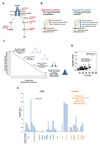Integrative genomic analysis implicates limited peripheral adipose storage capacity in the pathogenesis of human insulin resistance
- PMID: 27841877
- PMCID: PMC5774584
- DOI: 10.1038/ng.3714
Integrative genomic analysis implicates limited peripheral adipose storage capacity in the pathogenesis of human insulin resistance
Abstract
Insulin resistance is a key mediator of obesity-related cardiometabolic disease, yet the mechanisms underlying this link remain obscure. Using an integrative genomic approach, we identify 53 genomic regions associated with insulin resistance phenotypes (higher fasting insulin levels adjusted for BMI, lower HDL cholesterol levels and higher triglyceride levels) and provide evidence that their link with higher cardiometabolic risk is underpinned by an association with lower adipose mass in peripheral compartments. Using these 53 loci, we show a polygenic contribution to familial partial lipodystrophy type 1, a severe form of insulin resistance, and highlight shared molecular mechanisms in common/mild and rare/severe insulin resistance. Population-level genetic analyses combined with experiments in cellular models implicate CCDC92, DNAH10 and L3MBTL3 as previously unrecognized molecules influencing adipocyte differentiation. Our findings support the notion that limited storage capacity of peripheral adipose tissue is an important etiological component in insulin-resistant cardiometabolic disease and highlight genes and mechanisms underpinning this link.
Conflict of interest statement
The authors report no conflict of interest relative to this study.
Figures




Comment in
-
A multitrait GWAS sheds light on insulin resistance.Nat Genet. 2016 Dec 28;49(1):7-8. doi: 10.1038/ng.3758. Nat Genet. 2016. PMID: 28029160
References
-
- Lillioja S, Bogardus C. Obesity and insulin resistance: lessons learned from the Pima Indians. Diabetes/metabolism reviews. 1988;4:517–540. - PubMed
Publication types
MeSH terms
Substances
Grants and funding
- 098381/WT_/Wellcome Trust/United Kingdom
- 095515/Z/11/Z/WT_/Wellcome Trust/United Kingdom
- MR/N01104X/2/MRC_/Medical Research Council/United Kingdom
- MR/N003284/1/MRC_/Medical Research Council/United Kingdom
- MC_UU_12015/1/MRC_/Medical Research Council/United Kingdom
- MR/N01104X/1/MRC_/Medical Research Council/United Kingdom
- MC_PC_13046/MRC_/Medical Research Council/United Kingdom
- 14136/CRUK_/Cancer Research UK/United Kingdom
- 100574/Z/12/Z/WT_/Wellcome Trust/United Kingdom
- 107064/WT_/Wellcome Trust/United Kingdom
- WT_/Wellcome Trust/United Kingdom
- MC_PC_13048/MRC_/Medical Research Council/United Kingdom
- WT098051/WT_/Wellcome Trust/United Kingdom
- 090532 /WT_/Wellcome Trust/United Kingdom
- MC_QA137853/MRC_/Medical Research Council/United Kingdom
- G1000143/MRC_/Medical Research Council/United Kingdom
- MC_UU_12012/5/MRC_/Medical Research Council/United Kingdom
- G0401527/MRC_/Medical Research Council/United Kingdom
- MR/L00002/1/MRC_/Medical Research Council/United Kingdom
LinkOut - more resources
Full Text Sources
Other Literature Sources
Medical

